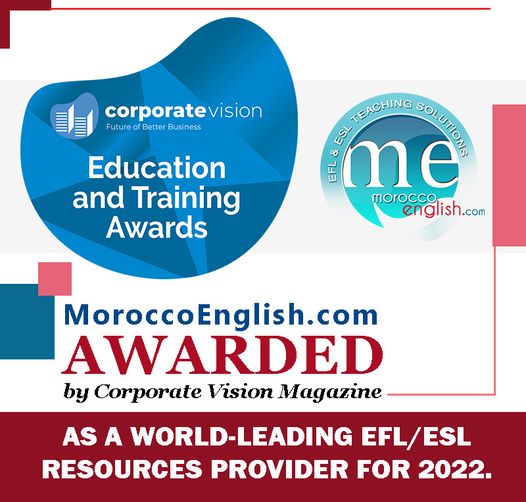My dear readers,
 What you are about to read in not entirely mine, I am inspired by many things I have read, heard and witnessed. I think adding my voice may change things…!
What you are about to read in not entirely mine, I am inspired by many things I have read, heard and witnessed. I think adding my voice may change things…!
Who knows maybe…!
The controversial issue of the educational system in Morocco and the its successive failures have pushed me again to take my pen between my fingers and write about this matter. In this vein, the majority of Moroccans still wonder about the core effects of these crucial problems and setbacks. I will try to examine below the causative factors that lead up to the failure of our educational system. In addition, I will provide some solutions according to which I think are the basic elements and most effective that will make our educational system get better than it was.
We all agree that education is the basic element and foundation stone in any country’s development. This is meant that it is classified on the top of the list when it comes to the factors affecting the development and advancement of a given country. Education is the backbone of any society’s progress which should be therefore given more interest and concern than any other sector .However; The situation of education in morocco is getting damaged year by year due to a set of problems that surrounding Moroccan schools including cheating, dropping out, committing suicide ,and both verbal and physical violence. In spite of successive reforms since independence, on the ground there has been no tangible change so far. The failure of our educational system is basically interconnected to many variables that can either be linked to students, curriculum designers, teachers, policy makers or parents.
As much as this intriguing issue is concerned, I personally believe that all attentions should be concentrated on both teachers and students or even parents as the main social factors who can play an important role in the progress of education. Firstly; teachers may either affect education positively or negatively. Unfortunately, some teachers still believe that their task is to fill the mind of students with information and ideas. That is not the objective of education, today. Students do not care much about what a teacher knows or has; rather, they are interested in how a teacher treats and teaches them.
For an effective teaching, a teacher should open the venues of communication with his/her students to know their feelings, ideas and even their problems. The ideas and opinions of students should not be disdained and rejected. Students should be given the chance to choose the material they need and the way of learning they like. Students are different. The teachers should take into account that they have different profiles within classroom; that is why they have to design a syllabus that can respond to the different needs of students. Moroccan teachers and students should be given the chance to participate in the life of education. Decisions should be taken with respect to the needs of students. This means that students should participate in curriculum design and decision making. Thus decision makers of educational reform that should take students and teachers into consideration as important element to reach fruitful results of high quality of education.
Secondly, by increasing demand on Information Communication Technology over the world, I am more convinced that the adaptation of technological tools into our educational system would be a very interesting potential for modern education to create highly qualified students to be easily engaged later on into labor market. For this demand, our schools and universities should be well equipped with these technological and digital items so that all Moroccan students in the near future would be able to have access to the world of technology with no difficulty or even follow their study from home or elsewhere in the world. To achieve this new technical methodology; the government should pave the way for all Moroccan students to have access to ICT. In this regard, teachers and students should be trained to use ICT so that the learning will be facilitated. It is a shame to find some teachers who are illiterate in ICT. They think of computer as a waste of time, and see the internet as a tool that instills bad behaviors among learners.
Thirdly, there is no doubt that parents can also contribute to the failure and improvement of our educational system through the way how they treat their children at home. These behaviors in return can be either reflected positively or negatively on a student’s self-esteem through the process of education and his own life alike. Thus; Parents have the vital role to play in determining children’s success at school. There are certain things that are not fundamentally a teacher’s responsibility; these must be taught at home. For example, to value education, students should see their parents read from time to time. Parents should have books in the house in order to show their children how to search and get information. If parents cannot afford books, then they should take their children to the library.
The other important thing that parents must do is to teach their children to respect authority. Lack of order and discipline is sometimes the number one problem in the classroom. Parents have to be more careful and demonstrate to children that they have to abide by law and regulations and respect authority. If children hear their parents criticizing and ridiculing authority, then they in turn will lose respect for their teachers. Actually, parents and teachers must work together to instill right values in children. Parents must also teach their children to do their homework.
As a conclusion, for the educational system to succeed in Morocco, policy makers, teachers, parents and curriculum designers must sit together with students in order to know exactly what they need. Parents must teach their children how to respect their teachers and how to do their homework. Policy makers have to take the students’, parents’ and teachers’ opinions into consideration while taking decisions. Teachers must open the venues of communication with their students to know more about their ways of learning, feelings and even problems. Curricula designers must take into consideration the socio-cultural and economic context of students while designing the curricula. Finally, information communication technologies must be expanded to reach all schools and universities.




































